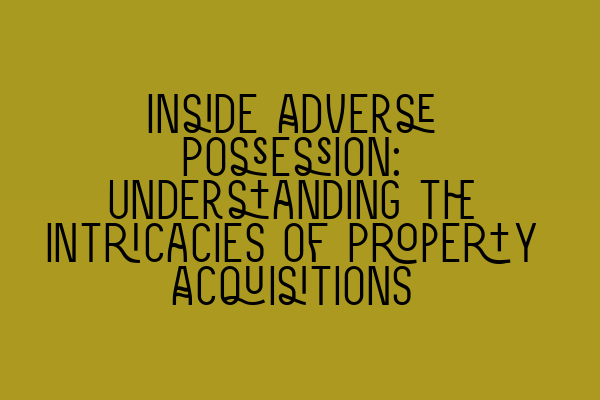Welcome to SQE Property Law & Land Law! As experts in property law, we understand the complexities and intricacies involved in property acquisitions. One such process that often raises questions is adverse possession. In this blog post, we will take you inside the world of adverse possession, shedding light on its key elements and providing you with a comprehensive understanding of this fascinating area of law.
Before we delve into the nitty-gritty, it’s worth mentioning that unlocking legal research skills is essential for success in the SQE exam. To learn more about this topic, check out our article on unlocking legal research skills for SQE success. And if you’re a prospective SQE candidate looking to solidify your functioning legal knowledge, our article on FLK core concepts is a must-read.
Now, let’s dive into adverse possession. In simple terms, adverse possession refers to the acquisition of someone else’s property through open, continuous, and exclusive possession for a specified period of time. This concept has been around for centuries and is aimed at preventing disputes arising from abandoned or neglected land.
To clarify, adverse possession occurs when someone occupies and treats a piece of land as if it were their own, without the permission or knowledge of the true owner. This possession must be:
1. Open: This means that the possession must be visible and obvious to anyone who may have an interest in the land. It could involve actions such as erecting fences, building structures, or even residing on the property openly.
2. Continuous: The possession must be uninterrupted and continuous over the specified period of time, which varies depending on the jurisdiction. In England and Wales, the period is generally 10 to 12 years.
3. Exclusive: The possession must exclude the true owner and any other unauthorized persons from using or enjoying the land.
It’s important to note that adverse possession doesn’t automatically transfer legal ownership. Instead, it serves as a legal mechanism that allows the possessor to apply for registered title after the specified period of possession. This process involves making an application to the Land Registry, which will assess the claim based on several criteria.
To prepare yourself for the SQE exam, it’s crucial to build a solid foundation of knowledge. Our article on essential SQE textbooks will provide you with valuable recommendations to enhance your exam preparation.
Now, let’s take a closer look at the key factors that can affect an adverse possession claim:
1. Good faith: In some jurisdictions, the possessor must demonstrate that their occupation was done in good faith, meaning they genuinely believed they had the legal right to possess the property.
2. Payment of taxes and maintenance: The possessor may need to prove that they have been paying property taxes and taking care of maintenance expenses during the period of possession.
3. Enclosure acts and boundaries: Adverse possession may be influenced by the existence of enclosure acts, which delimit landownership and can impact the claim.
4. Prior rights and disabilities: If the true owner has prior rights or disabilities that prevent them from taking action, it could affect the outcome of an adverse possession claim.
To navigate the complex journey of the SQE stages, it’s crucial to have a roadmap to success. Take a look at our article on unraveling the SQE stages to gain a clear understanding of what lies ahead.
Now that we’ve explored the key elements of adverse possession, let’s highlight its significance and potential implications:
1. Property disputes: Adverse possession can lead to contentious disputes between the possessor and the true owner. Resolving such disputes often requires legal expertise and can result in lengthy court proceedings.
2. Land registry reform: Adverse possession laws and processes are subject to ongoing debates and potential reforms. Governments and legal bodies regularly review legislation to strike a balance between protecting legitimate owners and acknowledging long-term possessors.
3. Property development: Adverse possession claims can impact property development plans and may hinder or delay construction projects. Developers must be aware of the potential risk and seek legal advice when necessary.
4. Land management: Adverse possession also plays a role in land management strategies. Owners need to be proactive in monitoring their property to identify any unauthorized occupation and take appropriate legal action.
When it comes to choosing a test center for the SQE, convenience and accessibility are key factors. Our article on test centers for SQE provides valuable insights to help you select the most convenient location for your exam.
In conclusion, understanding the intricacies of adverse possession is essential for property law professionals and aspiring SQE candidates alike. By grasping the key elements, potential implications, and associated factors, you’ll be equipped with the knowledge needed to tackle adverse possession scenarios effectively.
At SQE Property Law & Land Law, we strive to provide you with comprehensive insights into property law to support your professional development and exam preparation. Stay tuned for more informative articles and resources to enhance your understanding and advance your legal career.
